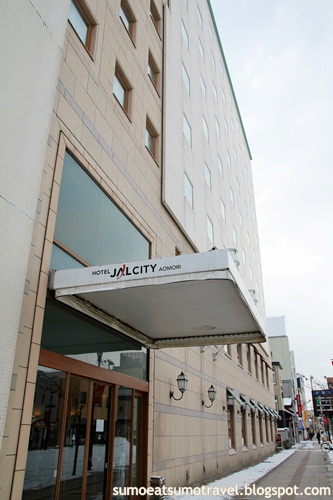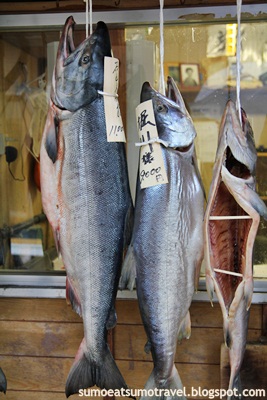Just a minute walk away from Aomori station, A-FACTORY houses various eateries, a local produce market, as well as a small cider factory where you can watch the production of hard cider made from apples produced from Aomori.
A-FACTORY stands out with it's bright lights at night.
The first thing you will see is the Food Marche, selling a variety of fresh produces and Aomori processed foods.
A variety of juices and dressings, naturally made from Aomori local produces such as tomatoes, grapes and of course Apples!
Not to forget Jams! also made from Aomori apples.
Aomori produces a huge variety of apples, which are also made into apple juices.
These are not wine, but apple cider. Cider is a fermented alcoholic beverage made from fruit juice, most commonly and traditionally made from apple juice.
A-FACTORY also has a brewery producing a variety of apple ciders.
This must be my no. 1 favourite dessert / omiyage during my Northern Japan trip. Called "Asa no Hakkoda" (朝の八甲田) it's a smooth and creamy cheese cake found only in Aomori.
As it had to be refrigerated, I couldn't buy it back home (╯︵╰,) but I sure did try a few of the samples provided. Sure enough, the smooth and creamy cheesecake really melts in your mouth, making you longing for more!
Here's another french patisserie selling a variety of tarts. Ranging from fruit tarts such as cherries, prunes, bananas, apples, to sweet potato tarts, and even an all nut tart, there is definitely one which is your suits your palette.
Not able to buy the Asa no Hakkoda, my consolation is the apple tarte (Tarte Aux Pommes) for dessert. Selling at JPY380 (SGD5), the tart was filled with loads of apples, not too sweet with a tint of sourness. A refreshing tart, but could be even better if toasted hot.
Aomori A-FACTORY
青森県青森市柳川1-4-2
Yanakawa 1-4-2 Aomori Shi, Aomori
Open daily: 9am - 8pm
5 mins walk from Aomori station
www.jre-abc.com (japanese only)
Asa no Hakkoda (朝の八甲田)
www.arpajon.co.jp
15 March 2013
5 March 2013
Aomori Hotel JAL City
After an exhausting 8 hours train ride from Niigata, we finally reached Aomori City!
The first thing we did was to check into our hotel - Hotel JAL City, Aomori.
This hotel must be the best hotel during our stay in Japan this time round. The room costs us JPY8000 per night (approximately SGD120). Still great value worth the money. The only downside is that as it is approximately 10 minutes walk away from Aomori station, we had to drag our luggages in the slippery snow to the hotel.
We had a spacious room, and even the toilet is bigger than the normal business hotels.

A great sunrise view from the hotel.
Our hotel is just 5 minutes walk away from the ASPAM tourist center. A place where gift shops, restaurants, local crafts and an observation deck where you can have a great view of the city.
Just located a few steps away from the hotel, is a monument commemorating Japan's no. 1 best tasting water.
Aomori Hotel JAL City
青森県青森市安方2丁目4番12号
2-4-12 Yasukata, Aomori Shi, Aomori
Nearest train station: JR Aomori
www.aomori.jalcity.co.jp
The first thing we did was to check into our hotel - Hotel JAL City, Aomori.
This hotel must be the best hotel during our stay in Japan this time round. The room costs us JPY8000 per night (approximately SGD120). Still great value worth the money. The only downside is that as it is approximately 10 minutes walk away from Aomori station, we had to drag our luggages in the slippery snow to the hotel.
We had a spacious room, and even the toilet is bigger than the normal business hotels.

A great sunrise view from the hotel.
Our hotel is just 5 minutes walk away from the ASPAM tourist center. A place where gift shops, restaurants, local crafts and an observation deck where you can have a great view of the city.
Just located a few steps away from the hotel, is a monument commemorating Japan's no. 1 best tasting water.
Aomori Hotel JAL City
青森県青森市安方2丁目4番12号
2-4-12 Yasukata, Aomori Shi, Aomori
Nearest train station: JR Aomori
www.aomori.jalcity.co.jp
4 March 2013
Niigata Furumachi 古町
The best way to move around Niigata city is by their sightseeing bus, which stops at popular tourist spots in downtown Niigata. A 1 day pass cost JPY500 with unlimited rides on the bus.

Furumachi (古町) meaning 'old town' in Japanese is a shopping street lined with shops and stalls at both sides of the streets.
You can find a variety of stores selling various types of local produce along Furumachi.
The store sells various pickled vegetables or what we call "Tsukemono" in Japanese.
The fresh vegetables are very cheap! A big bunch of Niigata leek only sells for JPY120 (SGD2) !! And the daikon at JPY150 ? It's such a big daikon!
This store sells dried vegetables. Do you know what is the dried stuff beside the dried chilli ? We took a long time to figure it out too! It's actually dried daikon. They call it Kiriboshi Daikon, literally meaning cut dried daikon. It is normally blanched in boiling water can be used in a variety of dishes.
Dried salmon is also a popular item in Niigata. Whole salmon is preserved in salt and hung up to dry during winter.
Some dried salmon specialty stores have the customer's name and price of the salmon attached to the fish. A average sized dried salmon sells for approximately JPY7000 (SGD100).
Another local specialty of Niigata is the Sasadango. Sasa - meaning bamboo leaves in Japanese and dango meaning mochi balls. Sasadango - a glutinous rice flavoured with mugwort, filled with red bean paste wrapped in bamboo leaves.
Besides red bean filling, there are also other fillings, such as salty filling - Japanese kelp, kinpira or the gold award winning white bean filling sasadango.
A copy of the sightseeing bus route can be downloaded here

Furumachi (古町) meaning 'old town' in Japanese is a shopping street lined with shops and stalls at both sides of the streets.
You can find a variety of stores selling various types of local produce along Furumachi.
The store sells various pickled vegetables or what we call "Tsukemono" in Japanese.
The fresh vegetables are very cheap! A big bunch of Niigata leek only sells for JPY120 (SGD2) !! And the daikon at JPY150 ? It's such a big daikon!
This store sells dried vegetables. Do you know what is the dried stuff beside the dried chilli ? We took a long time to figure it out too! It's actually dried daikon. They call it Kiriboshi Daikon, literally meaning cut dried daikon. It is normally blanched in boiling water can be used in a variety of dishes.
Dried salmon is also a popular item in Niigata. Whole salmon is preserved in salt and hung up to dry during winter.
Some dried salmon specialty stores have the customer's name and price of the salmon attached to the fish. A average sized dried salmon sells for approximately JPY7000 (SGD100).
Another local specialty of Niigata is the Sasadango. Sasa - meaning bamboo leaves in Japanese and dango meaning mochi balls. Sasadango - a glutinous rice flavoured with mugwort, filled with red bean paste wrapped in bamboo leaves.
Besides red bean filling, there are also other fillings, such as salty filling - Japanese kelp, kinpira or the gold award winning white bean filling sasadango.
A copy of the sightseeing bus route can be downloaded here
Subscribe to:
Comments (Atom)


























